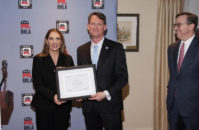Barnes-led opposition falls on deaf ears in Republican-controlled House
JEFFERSON CITY, Mo. – The Missouri House of Representatives has given final approval to one of many tort reform bills still on the Republican agenda this year, with the latest bill seeking to modify statute in regard to tort actions in asbestos cases.
Rep. Bruce DeGroot’s bill, HB 1645, or the “Asbestos Bankruptcy Transparency Act,” as it has been called, is his attempt to address issues related to damages in asbestos cases. It is similar to the bill he filed in the 2017 legislative session, but has some subtle changes.
“This bill has changed from last year,” DeGroot said during the perfection of the bill. “It’s a fair bill, it prevents double dipping and ensures that every plaintiff has their day in court.”
In short, the bill intends to prevent a plaintiff from filing an asbestos claim against a solvent defendant while not filing or disclosing claims against defendants who are deemed insolvent and working with bankruptcy trusts.
It prevents a “double recovery” or “double dipping” of compensation, while trying to ensure that the compensation is fair while allowing the trusts to remain solvent for a longer period of time.
“Right now we are known as the Sue-Me State, not the Show-Me State — the Sue-Me State,” DeGroot told the House. “Nobody wants to do business in the state of Missouri, because every time our businesses get sued, they get creamed.”
DeGroot also says that the provisions regarding discovery will help defendants in their attempt to determine who is responsible for the disease.
But along the bill’s path to perfection, it has taken several turns, with opponents hitting it from a number of sides, the most recent one being a letter from the Kaufman Fund, which called on the General Assembly to vote against the bill.
Kaufman Fund pens letter calling for General Assembly’s opposition of asbestos bill
Opponents of the bill maintain that it will delay cases because of the provisions providing an increase to discovery as well as motions to stay. Furthermore, they argue that the requirement to file a trust claim is complicated and time-consuming, putting an unnecessary burden on the claimants.
Speaking with Rep. Kevin Corlew on the bill, Rep. Curtis Trent asked if anything in the bill would increase costs or delays, to which Corlew responded it would not.
The two men also discussed the legal remedies left to those affected by mesothelioma, with Corlew saying that the bill would not prevent anyone from filing to either of the two tracks. Under current law, they have two routes: the bankruptcy trust route, the second is suing, where applicable, a non-bankrupt company.
Both the opponents and supporters of this bill have been preparing for the showdown for weeks, but once the bill hit the floor, Rep. Jay Barnes took the center stage.
Barnes wasted little time before launching into his arguments against the bill, telling his colleagues that those affected by asbestos were basically facing a death sentence.
“It’s not about double dipping, or protecting the trust funds,” Barnes continued. “The purpose of the bill is to prevent people who have been injured in this way from getting to a jury.”
Barnes says that the best evidence in an asbestos case is the plaintiff, and when they die, that goes away.
He spoke about some of the provisions of the bill with which he took exception, saying that under the bill’s language, it required a claimant to file everything in 30 days before even exercising their constitutional rights.
“Nowhere else do we require a person to waive attorney-client privilege,” Barnes argued, telling his colleagues that the process required plaintiffs to begin from a disadvantaged starting point. To illustrate this, he shared the viewpoint of how a firefighter affected by asbestos would have to proceed.
“In order to find out what the underlying trusts are, they have to file a lawsuit to get discovery to find out which products in the fire even were,” Barnes said. “You don’t get discovery answers for 90-120 days at best.”
All of that led to Barnes’ amendment to the bill, which he titled the “Goose-Gander Amendment.”
“I took everything in his bill that applies to the complainants, and I applied the same rule to defendants in the case,” Barnes said. “It applies the same to defendants as would be applied to plaintiffs who will die an excruciating death.”
Rep. Dean Plocher brought up the same scenarios, saying it also applies to contractors, workers, taking a significant amount of time to bring everything forward through discovery.
“Isn’t that what they want?” he asked Barnes, referring to the companies. “The cards are stacked against the dying victim, are they not?”
“Exactly,” Barnes responded. “This is only a burden on the dying.”
“What we’re saying is we would rather have our constituents die then get their day in court?” Rep. Steven Roberts asked Barnes.
Barnes replied it was a scenario that pitted Missouri citizens against out-of-state defendants.
“A lot of these companies… they’re not Missouri companies,” Barnes said. “They’re not Missouri companies.”
After perfecting the bill with a voice vote Tuesday evening with the help of the previous question, the House took it up for third reading on Thursday, where HB 1645 passed with a vote of 96-48.
Republicans managed to pass the measure, despite some of the members of their caucus not only voting against the bill but speaking in open opposition. Eleven Republicans cast no votes, compared to the 96 Republican votes in favor of the bill. The bill now heads to the Senate for consideration.
Benjamin Peters was a reporter for The Missouri Times and Missouri Times Magazine and also produced the #MoLeg Podcast. He joined The Missouri Times in 2016 after working as a sports editor and TV news producer in mid-Missouri. Benjamin is a graduate of Missouri State University in Springfield.



















